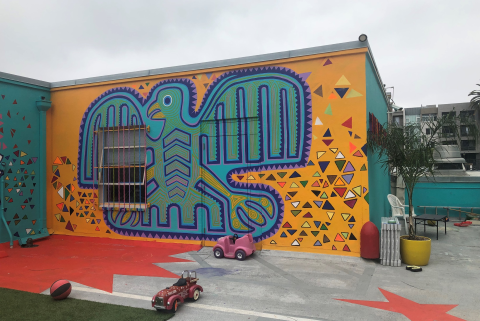Conference Notes: Jewish Funders Network/HIAS Border Tour
Background
While only 20 minutes away from downtown San Diego, the U.S.-Mexico border at San Ysidro, feels like a world away. As the largest land border crossing in the world, it has increasingly become a highly active location for deportations, human rights violations, and abuse by Customs Border Protection and Immigration and Customs Enforcement. Many years of devastating economic and immigration policies have created a situation in which thousands of people, coming primarily from Central America, have traveled hundreds, if not thousands of miles to flee extreme danger and suffering in their homelands in search of a safer, better life. According to the International Rescue Committee, people living in Central America’s Northern Triangle region, which comprises Honduras, Guatemala and El Salvador, are enduring violence comparable to that in a war zone. While they arrive with hope of a safer, better life, they also face enormous challenges and in desperate need of help.
A Border Tour
On June 2 – 4, Jewish Funders Network and HIAS brought a delegation of funders and foundation professionals to tour both sides of the border to witness and learn about this complicated and dynamic situation. Key to the experience were the local nonprofit organizations providing critical services to asylum seekers. Leichtag Foundation’s President and CEO, Jim Farley, and Vice President of Philanthropy, Sharyn Goodson participated in the convening. Below are some of their learnings.
Shelters South of the Border
Migrant shelters in Tijuana provide hope and a critically-needed respite for those running from violence and poverty. The shelters provide constant services, including meals, accommodations, and legal advice. They are filled beyond capacity and there are days when people are turned away because of the shortage of beds and supplies. The JFN funder group visited Casa del Migrante, which serves mostly male migrants over 18 years of age, sometimes fathers traveling alone with children. Centro Madre Asunta, a sister organization, shelters women and children. It has 44 beds for the 130 women and children on site. Everyone who arrives is carrying everything they own on their backs. Mostly they are single mothers with one to three children. Upstairs at the shelter is a classroom where, by day children are taught basic subjects, a practice that offers a much-needed sense of normalcy and routine during a chaotic time. By night, the classroom is converted to sleeping quarters. Both shelters are in constant need of supplies.
San Diego Social Service Support
On the U.S. side of the border, San Diego Rapid Response Network (Network) is a coalition of human rights, service and faith-based organizations, attorneys, and community leaders dedicated to aiding immigrants and their families. The Network was activated to respond to increased immigration enforcement activities within San Diego County and humanitarian issues arising at the border, including widespread family separation and unjust deportation of asylum seekers presenting at the Port-of-Entry.
Led by Jewish Family Service of San Diego, the Network opened a migrant shelter in late October 2018, the US began releasing hundreds of migrant families on to San Diego’s streets without following the usual protocol that ensures asylum seekers have travel plans and the means to join relatives and friends elsewhere in the country. Upon release, these families who do not speak English have no money, no cellphones and no tickets to travel. Many are also sick and dehydrated. Without the shelter and its services, they are great risk of becoming victims of human trafficking, or ending up on the street.
The shelter provides meals, medical care, legal services, and travel aid to 300 individuals; nearly 60-70 families a day. A total of over 16,000 people have been served to date. Most people stay 24 to 48 hours before leaving for their final destinations, where they will pursue the legal process required for asylum. While the shelter receives state funding for operations, additional support is needed to provide free legal representation and to fund bond fees for these families, as well as basic necessities, such as food, blankets and bedding, portable showers, baby/children needs, and toiletries. The shelter’s Amazon wish list includes specific, needed items.
In addition to its work in leading migrant shelter operations, Jewish Family Service offers an array of refugee resettlement services, working in partnership with HIAS for many years to ensure the safety and successful resettlement of refugees referred to San Diego County. The agency also provides comprehensive legal services for immigrants and their families. Services are provided for free or at low-cost and include answering questions about legal status, translating and submitting paperwork, and assisting with removal defense. The team includes immigration attorneys and Department of Justice accredited representatives dedicated to educating and advocating on behalf of immigrants and refugees.
Systems Change: A New Border Vision
In addition to learning from direct service providers, the JFN delegation also received a briefing from Andrea Guerrero, executive director of Alliance San Diego and a leader in the Southern Border Communities Coalition. The Coalition is a group of more than 60 organizations from San Diego to Brownsville, Texas, that work to promote policies and solutions that improve the quality of life of border residents. The Coalition just released A New Border Vision, a comprehensive plan promoting systems change in response to decades of border policies that have cast aside human rights, criminalized migrants and engaged in deadly and unaccountable border enforcement, undermining public safety for all. In a manner consistent with national values and global best practices, the plan seeks to expand public safety, protect human rights, and welcome residents and newcomers.
Opportunities for Philanthropy
As the experience revealed, there are many philanthropic opportunities to address this issue.
Primarily, these involve intervening to support direct services to asylum seekers requiring immediate help and include emergency shelter, legal services, food, medical aid, and clothing.
Organizations providing these services include:
- Casa del Migrante, and Centro Madre Asunta, migrant shelters in Tijuana
- Jewish Family Service of San Diego, which serves as the fiscal agent for the San Diego Rapid Response Network migrant shelter and also provides a host of refugee resettlement services.
- Casa Cornelia Law Center
There are also opportunities to support system change by funding efforts to advocate for improvement to current systems, laws and policies. Organizations working in this realm include:
- Alliance San Diego
- Southern Border Communities Coalition
- San Diego Organizing Project
- ACLU San Diego and Imperial Counties
For more information or any questions, please contact Sharyn Goodson at sharyn@leichtag.org.


